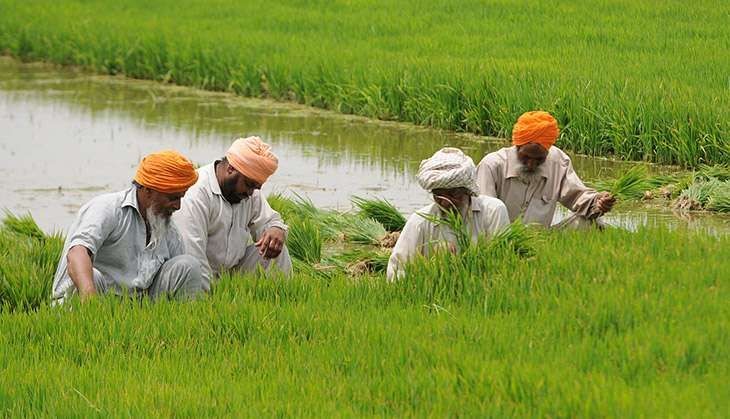
When angry farmers took out a mega rally in the heart of the Capital last month, the event wasn’t given as widespread coverage in the media as it deserved, perhaps due to political considerations. Subsequently, when the ruling BJP lost three states (albeit two of these were lost by a thin margin) to the Congress in the Hindi heartland, it portrayed this defeat as the result of anti-incumbency, carefully steering the narrative away from large-scale farm distress, which was a significant factor in BJP’s defeat.
And thereafter, when Congress president Rahul Gandhi announced mega farm loan waivers in these three states, the Centre termed it as a fiscal blunder. It is another matter that some BJP-ruled states have also announced similar plans to waive farm loans and such a largesse has been adversely impacting the fiscal health of these states.
So now, as reports begin trickling in about parleys within the government over devising a mega package for farmers before the model code of conduct kicks in for the 2019 general elections, is it any wonder that the Opposition is pooh-poohing the entire attempt to woo farmers? What the Congress has offered is waiver on loans farmers have taken but what the Centre may offer, according to media reports, is a variation of the scheme Telangana has in force called ‘Rythu Bandhu’. Here, the land-owning farmer is paid Rs 4,000 per acre per season. The explanation being given is that a repetition or some variation of the ‘Rythu Bandhu’ is a far better way of offering support to farmers through a sort of sustained income guarantee instead of waiving off loans.
Kedar Sirohi, working president of Kisan Congress in Madhya Pradesh, pointed out that loan waivers are a temporary solution to farmers’ woes. “A permanent solution is getting the farmer the correct price for his produce. We need to move towards income guarantee. This can happen in two ways: 1) By fixing minimum production guarantee through crop insurance. This will take care of weather vagaries and schemes like PM Fasal Bima Yojana can help here. Right now, this scheme is poor on implementation and needs improvement. 2) Offering price guarantee through MSP. Rythu Bandhu is a good scheme.”
So loan waivers may pale in comparison to income guarantee schemes. But offering loan waivers costs the state exchequer dear and mega farm packages involving additional support to farmers will also be similarly painful. Any such scheme, whatever be its contours and timeline, is surely going to punch a deep hole in an already precarious fiscal situation of India. As per the Controller General Accounts, the fiscal deficit between April and November has already reached 115% of the target on lower tax revenues and higher capital expenditure.
And analysts have been warning of fiscal slippage for months, saying it is nearly impossible for the government to stick to its 3.3% fiscal deficit target and the figure will likely be 3.5%.
Of course, this calculation does not take into account the hundreds of thousands of crores needed to placate angry farmers at a national level. It also does not account for any additional sops the Prime Minister may be planning for the middle class, in a burst of populism before he goes back to the electorate for a re-election. In short, the end result of loan waivers or packages devised in painstaking details to avoid the loan waiver morass is nearly the same — whichever way the income of the farmer is enhanced, the exchequer will be under additional strain.
It has often been pointed out that farm loan waivers are an inefficient tool to help farmers, since state governments do not have enough resources to waive all promised loans and a majority of farmers fail to benefit from the largess due to one reason or another. Then, such schemes obviously also hurt lending banks, which are already under a massive NPA crisis, complicating matters further and hurting the credit cycle.
According to analysts at India Ratings, the latest announcements on farm loan waivers by Madhya Pradesh, Chhattisgarh and Assam, extend the list of states which have resorted to this mechanism to address farmers’ distress. Andhra Pradesh, Telangana, Uttar Pradesh, Punjab, Maharashtra, Rajasthan and Karnataka have also waived farm loans since 2014. But the management of such loan waivers has differed across states.
AP and Telangana, which announced a waiver of Rs 43,000 crore and Rs 17,000 crore respectively in FY15 adopted a staggered payment mechanism. They rolled over the announced farm debt waivers over four years, with the last installment paid in FY18. UP, Punjab, Maharashtra, Rajasthan and Karnataka announced farm loan waivers during FY18. While the waivers by UP and Punjab were part of their respective FY18 budgets, the waivers by Maharashtra, Rajasthan and Karnataka were outside their FY18 state budgets. This meant the last three states had the option to either generate additional resources to fund farm debt waivers or cut budget. To put it simply, while staggered is the best option to fund loan waivers at the state level, in any case state governments may have to cut back on social sector (welfare) expenditure to fund these sops to farmers.
And while Direct Benefit Transfer (DBT) as seen in the Telangana ‘Rythu Bandhu’ model may be a more efficient way to offer sops to farmers, it will cause a huge hole in the fiscal health of the country – that cannot be in doubt. Will this lead to a cut in social and welfare expenditure of the Centre in the upcoming Vote on Account, or will it leave an unmanageable mess for the next government? This remains to be seen.


.jpeg)

